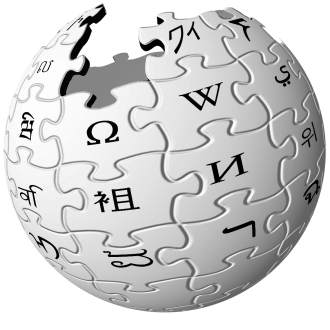Difference between revisions of "Wikipedia"
(fix link) |
(WP Link) |
||
| Line 3: | Line 3: | ||
|image_width=330px | |image_width=330px | ||
|URL=http://en.wikipedia.org/wiki | |URL=http://en.wikipedia.org/wiki | ||
| + | |wikipedia=http://en.wikipedia.org/wiki/Wikipedia | ||
|founder=Jimmy Wales, Larry Sanger | |founder=Jimmy Wales, Larry Sanger | ||
|start=January 15, 2001 | |start=January 15, 2001 | ||
Revision as of 15:08, 31 October 2014
| A vast, one of a kind multi-language, multi-editor encyclopaedia. |
"The free encyclopedia that anyone can edit"
Started: January 15, 2001
Contents
Sub-Pages
| Page Name | Size | Description |
|---|---|---|
| "Wikipedia/List of COVID-19 conspiracy theorists" | 3,284 | The people and groups that Wikipedia consider COVID-19 conspiracy theorists. |
| Wikipedia/Censorship | 9,442 | Wikipedia claims not to be censored. However, wikipedia's policies don't back this up. Their notions of 'reliability' and 'notability' are particularly suspect. |
| Wikipedia/Gaps | 1,575 | Some of wikipedia's most notable gaps. |
| Wikipedia/Hasbara | 46,459 | Systematic gatekeeping for Jewish interest on Wikipedia |
| Wikipedia/Notability | 5,610 | Wikipedia's supposedly impartial test used to censor topics, ideas and evidence from Wikipedia, while easy admission of disinformation sourced from commercially-controlled media. |
| Wikipedia/Problems | 23,952 | An analysis of Wikipedia's problems, which suggests that its failure to challenge the establishment is rooted in its subservience to organised money-power and is the fatal flaw from which a host of other symptoms arise. |
| Wikipedia/Protection | 1,760 | Wikipedia protects sensitive pages, to prevent anonymous edits which are deemed unwanted. Such protection is an indication that a page may be of deep political relevance. |
| Wikipedia/Reliability | 3,434 | Wikipedia deems some information sources as "reliable" and some as "unreliable", which provide an easy mechanism for blacklisting anyone who contradicts or questions the concensus trance promoted by commercially-controlled media. This website, by contrast, insists that wherever the source, information should be subject to critical scrutiny. |
| Wikipedia/Russian edition | 3,076 | The Russian-language version of Wikipedia - but not written by anyone in Russia! |
| Wikipedia/System gamers | 5,076 | Wikipedia accounts accused to manipulate content. |
Wikipedia has an impressive 30 million or so articles in around 300 languages. However, once over 50 thousand, the number of active English-language editors Wikipedia has been in decline since 2007, and stood by Summer 2013 at around 30,000.[1]
Official Narrative
Wikipedia bills itself as "the free encyclopedia that anyone can edit".
Centralisation
Wikipedia is a website, which means it is centralised.
Hierarchical Control
and while that is true, reverting people's edits is really easy, and so is blocking users or IP addresses. Not everyone can do that. Who decides who can and who can't? Wikipedia editors are kept in line with what has been called "a crushing bureaucracy with an often abrasive atmosphere"[1], one which gives special permissions to a very select group of editors - privileges that can be revoked if someone's decisions are deemed 'out of line' with the Official Narrative. Wikipedia is not as radically unbiased and fair as it purports to be, and increasingly reflects the agendas of those with deep pockets who have invested in shaping it to suit their commercial purposes.
Professionalisation
Wikipedia is not controlled by a grassroots organisation of volunteers. The number of individuals editing it has been in decline for years[1] and nowadays it receives multi-million dollar donations from companies and grant giving foundations such as from the Ford Foundation, Omidyar Network and Google, some of which have been linked to seats on the board of the Wikimedia foundation[2]. The business of paid edits is harder to document, but WikiScanner has shown that media organisations, PR companies, agents of the deep state and CIA are systematically editing pages of personal interest to them.
Censorship
- Full article: Wikipedia/Censorship
- Full article: Wikipedia/Censorship
Wikipedia is subject to censorship, either by swiftly reverting edits which expressed unwanted views (however factually based), or by disallowing edits on certain, particularly sensitive, topics by the page protection system.
Problems
- Full article:
 Wikipedia/Problems
Wikipedia/Problems
- Full article:
The core problem of Wikipedia is the problem of establishing reliability. In accordance with its increasing professionalization, its decision to depend on "reliable secondary sources such as mainstream media", echoes the pattern of commercially-controlled media the world over. It is therefore inevitable that at least on commercially or politically sensitive topics, Wikipedia tends to display a predictable pattern of symptoms:
| Wikipedia's Problems: |
 Bias Bias
|
 Censorship Censorship
|
 Gaps Gaps
|
 Spin Spin
|
 Obfuscation Obfuscation
|
See Also
- WikipediaPlus - A tool to supplement Wikipedia with content from alternative websites such as this
- Wikipediocracy - "We exist to shine the light of scrutiny into the dark crevices of Wikipedia"
- "When a primary source isn't good enough", discussion about Wikipedia's criteria for admissibility
References
- ↑ a b c The Decline of Wikipedia
- ↑ Wikipedia doesn't need your money - so why does it keep pestering you? - Critical article from The Register
